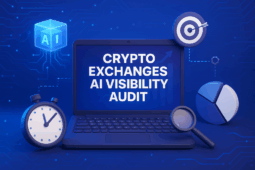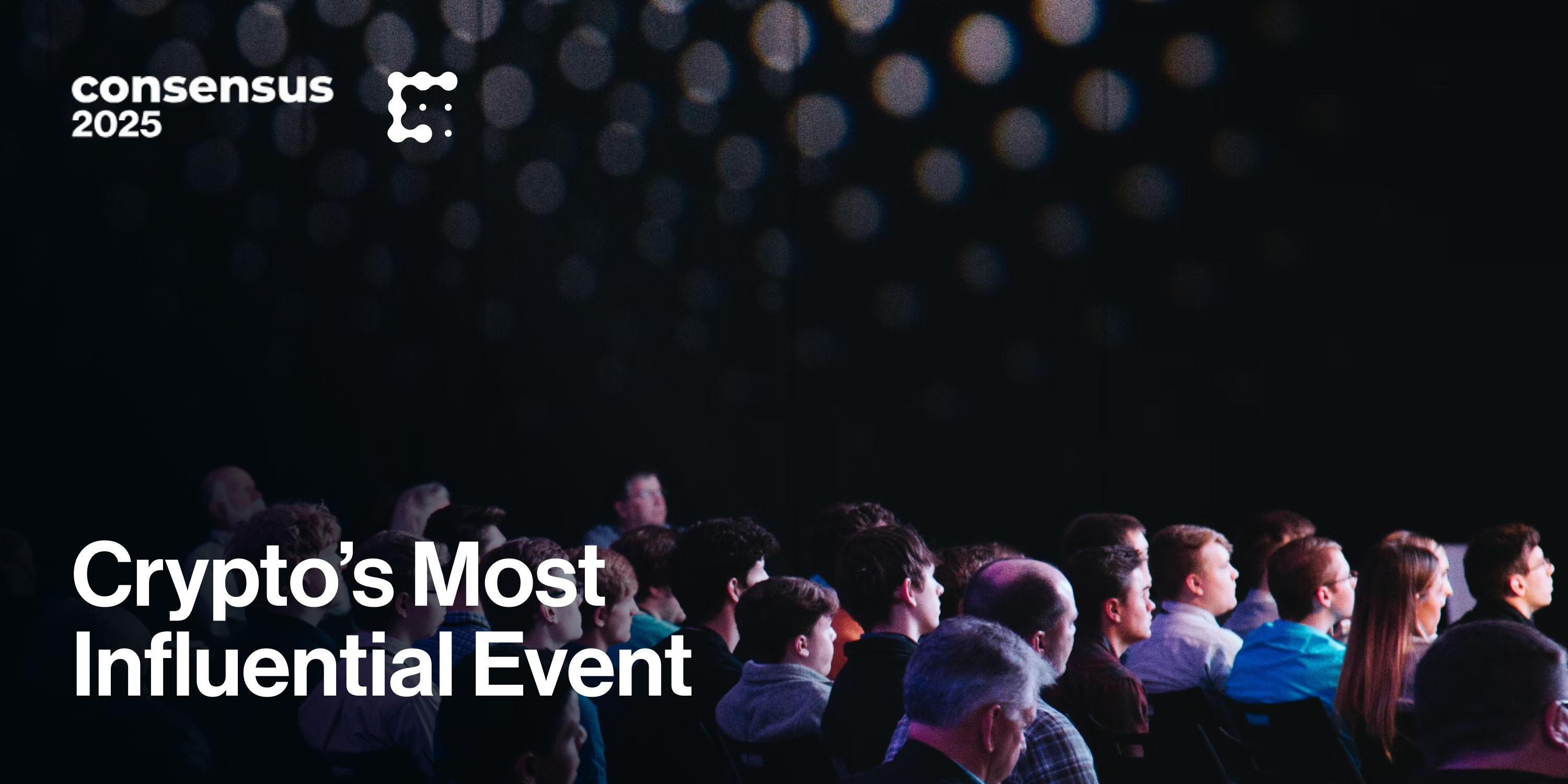share
NFTs are becoming more popular monthly and attract more users, artists and investors. While the most potent NFT use cases might still be to come, this technology is already transforming digital ownership, identity, creative expression, and community membership.
NFT marketplaces are essential in holding NFT tokens and connecting buyers and sellers. And the most exciting thing is that along with the development of NFT, NFT marketplaces based on their sale are also developing.
Such NFT marketplaces are profitable and easy to work with for digital art artists, and they also bring a significant and constant income to their creators and investors. An NFT marketplace allows users to build an account, upload digital artworks and make sales.
It is not an easy task for an ordinary person to build an NFT marketplace. But our team is ready to help you realize your idea and create an NFT marketplace with its unique pitch and purpose.
If quality is important to you, contact our specialists, our team is among the top companies in the field of blockchain platform development in 2021. You should also know that every significant business entity plans to build an NFT marketplace and pave the way for themselves in the NFT space.
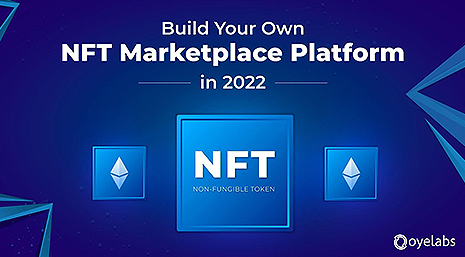
What is NFT?
A non-fungible token, or NFT in short, means that each digital asset such tokens represent is unique and can’t be exchanged for the same asset simply because it does not exist.
A non-fungible token essentially allows its buyer to say they own the original copy of a digital file the same way you might hold the original copy of a physical art piece.
It means that, unlike bitcoins or ether, NFTs are not identical to each other. NFTs can’t be traded or exchanged on an equivalent basis and cannot be used as a means of payment for trading operations.
NFTs are bought and sold on various online crypto exchanges, where people can place bids or buy NFTs outright. Purchases are typically made in cryptocurrency, often ether, since many of the NFT marketplaces are part of the Ethereum blockchain.
The growth of NFTs has been unpredictable during the past years, it has surpassed million-dollar and billion-dollar market value in just years, and it seems to reach several heights in the future as youngsters drive changes and progressive ideas.
The advancement of blockchain and NFT has brought multiple domains like music, art, image, videos, sports, metaverse, and other digital collectibles.
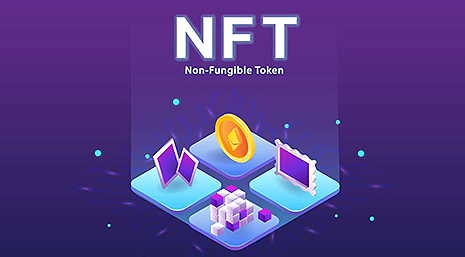
For example, NFT Cryptopunk 4250 is a certificate of ownership of a unique character that exists digitally. According to the description, it is a pixel image of a punk woman in welding glasses with messy hair and purple lipstick.
This lot is for sale on the Larva Labs marketplace for $116,913.

Another example of NFT is a picture of a cute girl smiling against the background of a burning house, which became a meme “Disaster Girl”. 21-year-old American Zoey Roth (she is in the photo) sold this meme for 500 thousand dollars.
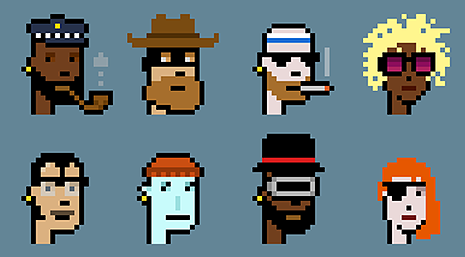
As you can see, NFTs can bring in crazy money. Some NFTs are more attractive; therefore, people are willing to pay significant amounts for them, while other NFTs are sold for pennies.
The principle of value formation in this market is simple: the more famous (in demand) the lot, the more expensive it is.
How Does it Work?
Unlike bitcoins, you can’t directly trade non-fungible tokens on conventional crypto exchanges. They are not directly interchangeable with other tokens. Each NFT token has an identified owner and can be bought and sold on a relevant NFT marketplace.
Such significant NFT marketplaces as OpenSea, Raible, Superfarm, Mintable and Nifty Gateway dominate this market.
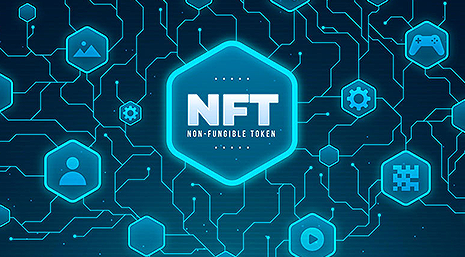
The NFT marketplace website works like regular online stores from the client’s side. The user must register on the platform and create a personal crypto wallet to store NFTs and cryptocurrencies.
Launching an NFT is usually simple and similar to creating an eBay ad. You need to specify the name, price, give description and image, photo, video, gif, and the like. Users can use the listing to purchase NFTs or create their tokens.
How Do NFT Marketplaces Work?
From the client’s perspective, an NFT marketplace can be comprehended. So, before diving deep into the characteristics of the NFT marketplace, you must analyze the existing NFT marketplaces to get the whole idea of their functionalities.
An NFT marketplace is an excellent platform for those who create digital assets or want to buy NFTs.
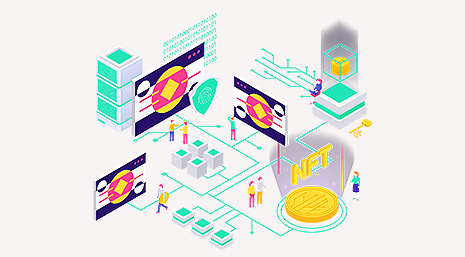
All NFT marketplaces demand users to sign up and download their apps, whether they are creators or collectors of NFTs. Their apps serve as a digital wallet for storing and accessing your NFTs.
Therefore, the users of an NFT marketplace must first install a crypto wallet to operate. This app stores the data of the owner’s files on the blockchain, which is different from the data stored on a disk drive.
Billions of NFTs are Being Traded on Digital Platforms
Such a digital platform is called an NFT marketplace. Simply put, an NFT marketplace is a platform that allows users to store, showcase, trade, and even create (mint) non-fungible tokens.
These platforms generally use blockchain technology to verify the provenance and authenticity of the digital assets represented on the NFT marketplace website.
Moreover, these NFT platforms bridge the gap between buyers and sellers by helping them to carry out their transactions smoothly.
The NFTs built on blockchain technology will protect the exclusivity and authority of digital assets. Blockchain network prevents theft, duplication and manipulation of digital assets. This is why digital creators are taking the NFT route to generate revenue.
Niches and Applications of NFT
Most NFTs are used to commercialize different types of digital art: from digital copies of actual paintings to memes.
For example, on the Open Sea trading platform, you can buy, sell and transfer images, videos, GIFs, and music. This platform runs on Ethereum and releases NFT using the ERC721 and ERC1155 protocols.
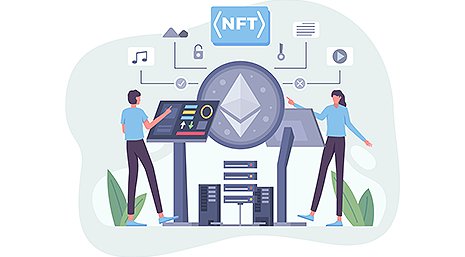
But fine art is not the only field of application of non-interchangeable tokens. They can also be used to trade collectable cards (NBA Top Shot), game characters (CryptoKitties), real estate (Mintable), virtual worlds (Metaverses), investment offers, and in any other area where you can tokenize ownership of something. The main thing is to create an NFT marketplace that can work with the ownership you need.
For example, if you want to create an NFT marketplace for the fine art trade, then you need to create a regular online store, the server part of which should be able to produce, store, sell, and change NFT.
It’s relatively simple. If you need an NFT marketplace for real estate trading, you must create an analogue of Zillow or Trulia. Such sites should be able to work with MLS databases and state register databases, determine the user’s location, etc.
Online Training
Such trading platforms should provide a full range of services for training via the Internet – from selling a training course to tracking the progress of the buyer’s training and communicating with teachers.
Investment Projects
Such NFT marketplaces should function as a stock market for securities trading. That is, they should provide the opportunity to issue legally legitimate securities with the right to ownership, dividends, or a share in profits.
Safety. Non-interchangeable tokens can work as access keys to content, program, database, operating system, or events. If you want to sell such NFTs, the trading platform must be as secure and reliable as possible and support popular means of protection on the buyer’s part (Touch ID, Face ID, Eye ID, etc.).
Video Games
The sale and purchase of NFTs, which symbolize unique game items or characters, usually occur either inside the game (for game money) or on external online platforms that guarantee the safe exchange of real money for a game asset (as in Steam). This implies a very close integration with the video game.
The Main Features of the NFT Marketplace
The NFT marketplace website combines the functions of an online store, an auction, and a blockchain platform for issuing non-interchangeable tokens. Users should be able to create their NFT products and sell them.
In addition, such an NFT marketplace (NFT platform) usually offers functions to attract and retain customers and improve service quality.
When developing your own NFT marketplace, it is better to start with the implementation of the following things.
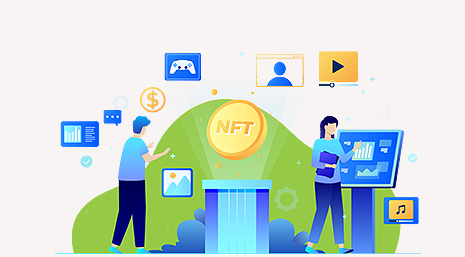
Showcase
This function provides visitors to the trading platform with all the necessary information about the lot: name, fixed price, description, preview, owner, purchase method, rating, etc.
Some NFT marketplaces also provide information about the blockchain and the token protocol so that users can verify the authenticity of the purchased NFTs.
Search Engine
Make sure your users can easily find the subject they are interested in. It would be nice to divide all assets into several categories, such as art, photography, video, domains, memes, and music, so that it is easier for users to navigate the store listing.
Filters also simplify navigation, especially if many items of the same type are on the platform.
Registration, login
To be able to buy or sell NFT on the NFT platform, the user must create an account.
Usually, the registration process occurs via email, phone numbers, or social media accounts. In addition, the user is also usually asked to specify his cryptocurrency address.
If it is unavailable, you can register using links to cryptocurrency wallets like Coinbase Wallet, Metamask, and MyEtherWallet.
Create an Ad
This process should be simple and not take much time. Ideally, it should be the same as on eBay. To achieve this, you need to think about the optimal user path and implement something like an OpenSea collection manager.
It helps quickly upload a product to the site and specify the token’s properties, such as name, price, description, tags, external link, etc.
Wallet for NFT
Users need a crypto wallet to send, receive and store tokens, digital assets, and cryptocurrencies (NFT transactions). The easiest way to do this is to provide integration with popular crypto wallets.
The main thing is that such wallets support the NFT protocol you need. These are usually wallets such as MetaMask, MyEtherWallet, Coinbase Wallet, and WalletConnect.
Our company is also ready to help you develop your crypto wallet.
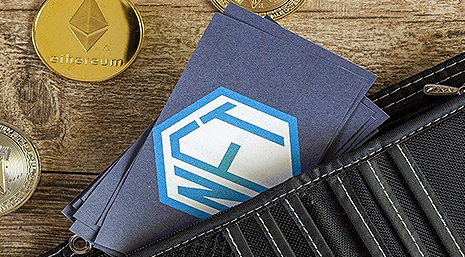
Trading History
Usually, the NFT marketplaces should have a section where the user can view their trading history. So you can understand how popular the site is, what it sells, and what price you need to pay.
For example, on OpenSea, the trading history includes the following data: events, product name, price, buyer, seller, and date.
Reviews and Ratings
Reviews and ratings show how much visitors like the lot or seller/buyer. This information helps users evaluate counterparties and specific lots.
Usually, the rating is implemented as a numerical evaluation of the product or likes.
Reviews can be implemented in the form of comments that all registered users can put and in the form of reviews that counterparties leave each other after the transaction is completed.
Notifications
You can implement a push notification system to inform users about new bids in a selected category or from a selected seller, a change in the status of a selected product, a new message, the sale of your lot, or an update of the NFT marketplace.
Support
This is an important element of any NFT marketplace. With the help of the support service, users will search for answers to their questions and solve problems and conflicts.
You can implement a support service through a call centre, via webmail, a separate information portal, or using a help bot.
NFT Standards
Standards are the driving force of an NFT. To launch a blockchain-based NFT, you need to use specific token standards that guarantee that the asset will act in a certain way and demonstrate how to interact with the main functions of the asset.
Currently, the most popular standards for running NFT are:
- ERC721. These tokens are unique and are non-interchangeable with other tokens of the same type. These tokens can either be physical property or digital property. This standart supports smart contracts and offers an authorized way to transfer assets using the transferFrom method.
- ERC1155. As a multi-token standard, ERC-1155 not only supports both fungible and non-fungible tokens but also supports the creation of semi-fungible tokens. Compared to the ERC721 standard, this is much more efficient.
So, if you are a video game developer and want to sell 100 sets of armour, then in the case of ERC721, you will need to register 100 smart contacts, and in the case of ERC1155, only one and register its number.
- BEP. The largest cryptocurrency exchange Binance at the end of the year, launched a new BSC blockchain with support for smart contracts and compatibility with the Ethereum virtual machine (EVM).
And it has analogues of ERC721 and ERC1155 for NFT – BEP-721 and BEP-1155, respectively.
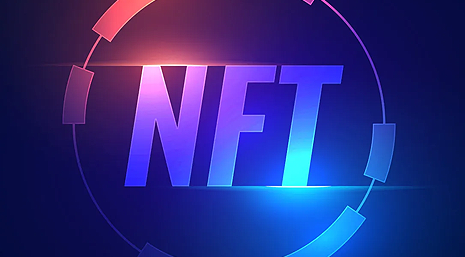
Custom NFT Marketplace Development
The trading platform for buying and selling NFT is complex software. The NFT marketplace development is best entrusted to a development company with relevant experiences, such as ICODA.
ICODA is a team of professionals in the field of custom NFT marketplace development of any blockchain platforms, protocols, and applications.
Now we will look at what steps you and the team must go through to create an NFT marketplace.
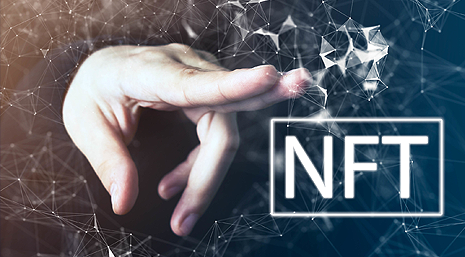
Project Opening
When you create an NFT marketplace, you and the NFT marketplace development team should study the details of your project to assess the technical feasibility of the NFT marketplace platform and its viability.
Here you have to answer the questions :
What niche will you work in?
- How exactly will you sell NFT?
- Who is your primary target audience?
- Which token protocol will you use?
- Which technology stack will you use?
- What monetization model will you use?
- What will make your project stand out from the competition?
- What functions do you intend to implement?
The answers to these questions will point you in the direction of the entire development process and help you develop specifications for creating your own NFT marketplace.
If it’s difficult for you to answer the questions, don’t worry, the NFT marketplace development team can help you. They can describe your ideas in a text and visual diagrams and prepare technical documentation so that you can start designing.
After the initial concept and specifications are ready, the development team can draw up an NFT marketplace development plan to indicate the approximate timing and budget of the NFT marketplace platform. After that, you can start designing.
Design and NFT Marketplace Development
The development team can start working when all the technical requirements and the development plan are agreed upon.
First of all, business analyst or designer develops the NFT marketplace user interface (framework, layouts, and prototypes) with a description of user flows and site functions.
An effective architecture of the NFT marketplace is also being created.
UX / UI design
Navigation and the appearance of the user interface are essential when developing an NFT marketplace since it is on them that the first impression, usability, and user experience in general depend.
Therefore, make sure that the design of your site will appeal to your audience and be simple enough to be understood by anyone who is at least a little familiar with Amazon and eBay.
The Back-end and Smart Contracts
At this level, the work of the entire internal (server) part of your NFT marketplace is carried out.
When developing it, in addition to the usual business logic and functionality of the marketplace, you must implement work with blockchain, smart contracts, and wallets and provide an auction mechanism (most NFTs sell with it).
Front-end
The entire external part of the NFT marketplace is the front-end, which is responsible for interacting with the end user. The main task of front-end development is to ensure ease of management, reliability, and performance.
Testing
At this stage, several code testing cycles are performed to make sure that your NFT marketplace is working correctly. The QA team runs several checks to ensure that your project’s code does not contain critical errors and bugs.
In addition, the content, usability, security, reliability, and performance are checked under all possible scenarios of using the NFT marketplace platform.
Deployment
When the platform is tested, it’s time to deploy your own NFT marketplace on a server (cloud). Please note that this is not the last stage, as you will also need to organize the work of the support service.
In addition, it is also necessary to plan further NFT marketplace development to follow market trends and user expectations.
Why Should I Choose ICODA?
Our team of professionals is among the top companies developing blockchain technologies by 2021.
Our company specializes in working with blockchain and crypto projects, so the work and development will be simple and exciting.
You will not need to think about the technical development process, participate in brainstorming and enjoy watching your idea become a thriving NFT marketplace platform.
Our specialists will accompany you throughout the entire workflow, from the concept’s origin to the platform’s full deployment.
Also, ICODA will help you technically implement the idea in real life, attract an active audience and investors, and gather a community for your own NFT marketplace.
Our team cares about the success of your project, which is why working with ICODA, you will get maximum efficiency.

